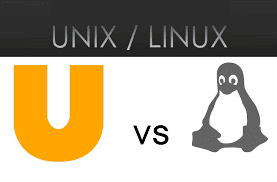Unix Vs. Linux : what is the difference?
Throughout the years, the product business has seen extraordinary changes — regardless of whether its shut source or open source. Also, open source is by all accounts additionally ruling as Linux has been a noteworthy player in the product space for quite a long time, and it's difficult for different OS to be as practical as Linux. Be that as it may, Linux could never come to the real world if Unix wasn't there.
In the event that you are a Linux lover, you would think about UNIX or if nothing else have known about Unix or Unix-like. This working framework has an a lot more extravagant history — something past just C programming. It goes back to the late 1960s when a group of developers at AT&T Bell Labs were coding a performing various tasks, multi-client working framework. What's more, in the mid 1970s they chose to revise the program, and today it is the base of a family tree that extended crosswise over research, the scholarly community, and a developing business Unix working framework business.
Despite the fact that both Unix and Linux have been around since decades and are likewise famous, many don't have a clue about that both the working frameworks are totally extraordinary.
Get the best information on Linux through Linux Online Training
Here Are Some Of The Major Difference Between Unix and Linux
Linux is a Unix Clone and Just a Kernel
Discussing Unix, it has a few subordinates, and only one out of every odd subsidiary is free and open source. For instance, MacOS is one of the subsidiaries and it is neither free nor publicly released. In any case, it is quick changing, and numerous Unix subordinates are rising as open source.
Truth:
In the event that you are a Linux lover, you would think about UNIX or if nothing else have known about Unix or Unix-like. This working framework has an a lot more extravagant history — something past just C programming. It goes back to the late 1960s when a group of developers at AT&T Bell Labs were coding a performing various tasks, multi-client working framework. What's more, in the mid 1970s they chose to revise the program, and today it is the base of a family tree that extended crosswise over research, the scholarly community, and a developing business Unix working framework business.
Despite the fact that both Unix and Linux have been around since decades and are likewise famous, many don't have a clue about that both the working frameworks are totally extraordinary.
Get the best information on Linux through Linux Online Training
Here Are Some Of The Major Difference Between Unix and Linux
Linux is a Unix Clone and Just a Kernel
Everything began with the fantasy of a free and open source working framework, yet wouldn't be conceivable without a practical piece. What's more, that is when Linus Torvalds composed Linux from the scratch — which is essentially a Unix clone. It is a working framework part that is structured like Unix's bit. Moreover, it's not only Linux, there are numerous different frameworks that are Unix-like and have comparative interfaces.
Permit and cost
We as a whole realize that Linux is "free and open source". Which means, one can download it from the web with no issue and furthermore, redistribute it under GNU licenses. One can roll out any improvements to the source and alter according to client comfort.
Permit and cost
We as a whole realize that Linux is "free and open source". Which means, one can download it from the web with no issue and furthermore, redistribute it under GNU licenses. One can roll out any improvements to the source and alter according to client comfort.
Discussing Unix, it has a few subordinates, and only one out of every odd subsidiary is free and open source. For instance, MacOS is one of the subsidiaries and it is neither free nor publicly released. In any case, it is quick changing, and numerous Unix subordinates are rising as open source.
Truth:
When Unix was first presented, it was not open source — the Unix source code was licensable by means of concurrences with AT&T. Additionally, the primary Unix permit was sold to the University of Illinois in 1975.
Security
Security
Being an open source OS piece, it accompanies open source netfilter/iptables based firewall for server and work area assurance. While, then again, some Unix subsidiaries accompany its own firewall, for example, ipfilter, and some doesn't accompany any firewall, which means, the client needs to buy an outsider firewall apparatus.
Get secured to your system through Cyber Security Course in India
Compactness
The prime purpose for composing Unix in C is to make the working framework convenient and accumulate on pretty much every CPU utilized in figuring today. In any case, that couldn't occur totally — numerous Unix usage, in spite of being composed basically in C, are not genuinely convenient. While then again, Linux is driving as far as transportability. You should simply have a USB stick and a PC — you can download the live form of the OS, duplicate it on the USB stick and use it as a live form, without introducing.
Network Support
With regards to network support, Linux outworks a ton of programming. Being open source, it has a monstrous network of engineers who are amazingly dynamic and dependably work to make the Linux experience better.
Get secured to your system through Cyber Security Course in India
Compactness
The prime purpose for composing Unix in C is to make the working framework convenient and accumulate on pretty much every CPU utilized in figuring today. In any case, that couldn't occur totally — numerous Unix usage, in spite of being composed basically in C, are not genuinely convenient. While then again, Linux is driving as far as transportability. You should simply have a USB stick and a PC — you can download the live form of the OS, duplicate it on the USB stick and use it as a live form, without introducing.
Network Support
With regards to network support, Linux outworks a ton of programming. Being open source, it has a monstrous network of engineers who are amazingly dynamic and dependably work to make the Linux experience better.
A standout amongst the best models is the point at which somebody finds a bug and report on the discussion, the whole network begins reacting and begins attempting to determine.
In any case, that isn't the situation with Unix — as few out of every odd Unix derivate is open source, Unix clients require longer hold up time, to get the correct bug fixing patch
For more information on Linux visit Linux Training
In any case, that isn't the situation with Unix — as few out of every odd Unix derivate is open source, Unix clients require longer hold up time, to get the correct bug fixing patch
For more information on Linux visit Linux Training









No comments: